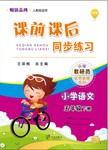题目内容
.Steven’s exam results put him _________ the top ten students in his grade.
A.among B.between C.in D.at
【答案】
A
【解析】

练习册系列答案
 教学练新同步练习系列答案
教学练新同步练习系列答案 课前课后同步练习系列答案
课前课后同步练习系列答案 课堂小作业系列答案
课堂小作业系列答案 黄冈小状元口算速算练习册系列答案
黄冈小状元口算速算练习册系列答案
相关题目
题目内容
.Steven’s exam results put him _________ the top ten students in his grade.
A.among B.between C.in D.at
A
【解析】

 教学练新同步练习系列答案
教学练新同步练习系列答案 课前课后同步练习系列答案
课前课后同步练习系列答案 课堂小作业系列答案
课堂小作业系列答案 黄冈小状元口算速算练习册系列答案
黄冈小状元口算速算练习册系列答案